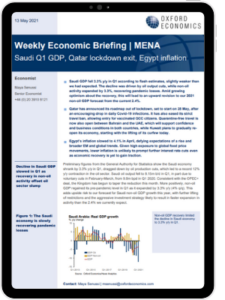MENA | Saudi Q1 GDP, Qatar lockdown exit, Egypt inflation

Saudi GDP fell 3.3% y/y in Q1 according to flash estimates, slightly weaker than we had expected. The decline was driven by oil output cuts, while non-oil activity expanded by 3.3%, recovering pandemic losses. Amid growing
optimism about the recovery, this will lead to an upward revision to our 2021
non-oil GDP forecast from the current 2.4%.
What you will learn from this report:
- Qatar has announced its roadmap out of lockdown, set to start on 28 May, after an encouraging drop in daily Covid-19 infections.
- Egypt’s inflation slowed to 4.1% in April, defying expectations of a rise and broader EM and global trends. Given high exposure to global food price movements, lower inflation is unlikely to prompt further interest rate cuts even as economic recovery is yet to gain traction.
- Quarantine-free travel is now also open between Bahrain and the UAE, which will support confidence and business conditions in both countries, while Kuwait plans to gradually reopen its economy, starting with the lifting of its curfew today.
Tags:
Related Services

Post
Eurozone: Little sign of harm from the Red Sea disruptions
The impact of Red Sea shipping disruption on the eurozone economy continues to be limited, in line with our baseline view. Our new Eurozone Supply Stress Indicator suggests that supply pressures have returned to normal following a period of easing in 2023.
Find Out More
Post
GCC: Key themes shaping city economies in the near term
For Gulf cities, the near-term outlook will be tied not only to the global macroeconomic backdrop, but also the progress of the diverse visions and strategies in the region. With the aim to diversify their economies and reduce the dependence on oil, Gulf states continue to invest in the non-oil economy and implement various reforms. That said, oil revenues remain key to funding diversification efforts.
Find Out More